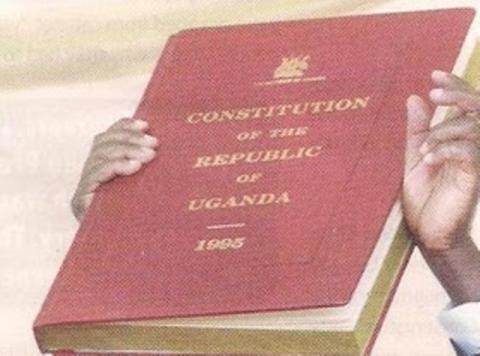
By CRIS MAGOBA
As Uganda gears up for the 2016 general elections there are calls for constitutional reforms to ensure a smooth voting process and to forestall the violence that has bedevilled the past elections.
A cross section of civil society organisations and opposition political parties have been traversing the country drumming up support for constitutional amendments before 2016. The government has also weighed in bringing proposals that they say are expected to consolidate the democratic gains that have been registered over the years since 1986.
According to the proponents of the reforms and legal experts, constitutional and other legal amendments will advance democracy if they are arrived at by consensus.
The adoption of a new constitution in 1995 promised a new beginning for Uganda. After more than three decades of political instability, widespread human rights abuses and a nearly collapsed economy, the 1995 constitution promised a new beginning on the horizon. Among other things, the constitution sought to establish the critical foundations for a new political dispensation rooted in the principle of democracy, separation of powers, respect for fundamental human rights and freedoms, and the rule of law.
The most salient proposal that has aroused a lot of public interest is in regard to the electoral commission. According to the current arrangement, the Electoral Commission (EC) is appointed by the President and approved by Parliament. Article 60 of the Constitution provides that, “There shall be an Electoral Commission which shall consist of a chairperson, a deputy chairperson and five other members appointed by the President with the approval of Parliament”
The EC is also supposed to be independent as provided for under Article 62 of the Constitution. The Article states that, “Subject to the provisions of this Constitution, the Commission shall be independent and shall, in the performance of its functions, not be subject to the direction or control of any person or authority.”
On the face of it, the electoral body is supposed to perform its function professionally without undue influence from any source. However supporters of electoral reforms are calling for a commission appointed by an independent body and not by a player in the politics, and in this case the President who in our recent history also happens to be a candidate. According to Breaking the Conflict Trap in Uganda: Proposals for Constitutional and Legal Reforms, a publication of ACFODE a civil society organisation, previous experience shows that the current EC cannot perform its functions impartially because of the manner in which it is constituted. The publication notes that: “The independence of the Electoral Commission is not only a question of theory, or laws being in place but also a matter of practical application of required standards. At a practical level however, the independence and competence of the EC has been questioned because of its conduct in the past elections. The elections were marred by several irregularities and illegalities. In the two presidential election petitions of 2001 and 2006, the Supreme Court found that the EC had failed to administer free and fair elections.
There is therefore agitation from some sections of Ugandans especially the political opposition and the civil society that if the EC is not appointed by an independent body, it should at least have representation of nominees from the opposition political parties. To emphasise this point ACFODE, in its continued campaign for electoral reform notes that, “The opposition political parties have always expressed misgivings about the independence and competence of the EC. The manner in which the EC was constituted, its conduct in administering elections has eroded the citizen’s trust that it is a neutral body. The nomination, appointment and removal from office procedures are but the most critical means to guard against impartiality, ensure greater independence and attainment of acceptable levels of competence of the EC. A review of these processes will not only enhance confidence in the democratic process but also ensure that elections reflect the true will of the citizens”.
There has also been the issue of the competence of the members of the EC. The appointment to office of the members of the commission should be based on clearly defined criteria that ensure competence and accountability.
Although the constitution (article 60 claus 2) provides that members of the commission shall be persons of high moral character, proven integrity and possess considerable experience and demonstrated competence in the conduct of public affairs such qualifications have rarely informed the nominations and approvals by the President and Parliament. Rather, political underpinnings have always appeared to take greater considerations.
In other jurisdictions, the chairperson of the commission should be a person qualified to be a judge of the High Court.
Consequently, the provision of article 60 (3) of the constitution should be amended to provide for qualification of the EC Chairperson to preferably be a retired judge or a person with equal or similar qualifications. Similarly, the process of appointment should be more open, inclusive and democratic so as to ensure public scrutiny and accountability and not at the pleasure of the President. The process of nominations, vetting, approving and appointment should provide for public participation.
Legal experts and other proponents of reform have had their arguments lent credence by the fact that, through its post-independent history (Uganda has been independent since 1962 celebrating 50 years of independence in 2012), the country has never had a successful transition from one president to another. Until the coming into power by President Museveni and the National Resistance Movement (NRM), change of presidents was secured through military coups (1971-and armed rebellion.
By and large therefore if the constitutional amendments being proposed in respect of the electoral commission carry the day, it will be on step in the right direction. Of course there are other proposals being mooted to promote free and fair elections. They include:
- Tenure of office
- Regulation of Financing and Monetization of Elections
- Restoration of Presidential Term Limits
- Separation of Powers
- Role of the Army in Elective and Partisan Politics
- Size of Parliament
They can be considered on their own merit and if passed they can also advance Uganda’s journey to full democracy.
The author is an MA student at the Department of Journalism & Communication
- Log in to post comments




